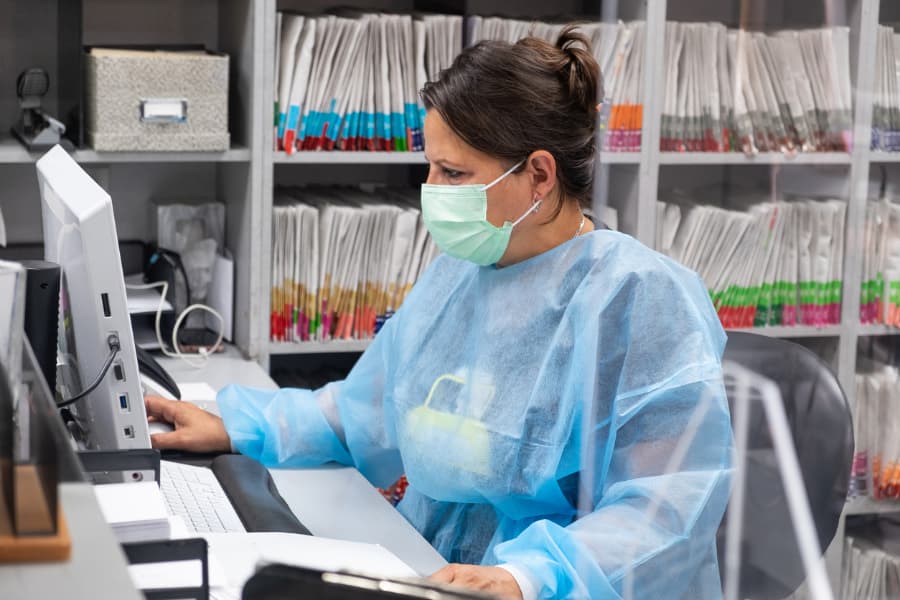
Medical assistants care for patients and help manage administrative tasks within hospitals, clinics, and other healthcare venues. Enrolling in a medical assistant program allows aspiring professionals to receive the training and experience they need for this position.
Supervisors within all healthcare settings count on medical assistants to fulfill essential tasks. Medical assistant duties and responsibilities vary depending on the healthcare venue they serve, as well as the circumstances of a given day. Here, Prism Career Institute explains what’s typically expected of an entry-level medical assistant.
A Medical Assistant’s Duties with Patients
A considerable amount of a medical assistant’s time may be dedicated to patient care. This could mean helping infants, children, and adults at any stage of life. They also may work with cancer patients or patients seeking treatment for alcohol or drug use. Regardless of a task, an assistant must adhere to healthcare standards and protocols within their workplace to deliver the best patient care possible. It’s also crucial to maintain patient confidentiality and follow Health Insurance Portability and Accountability Act (HIPAA) regulations.
Work involving patients may include the following:
- Collecting lab specimens: An assistant may gather different patient samples for a physician to review to get an overview of a patient’s health condition.
- Obtaining background information: Before a patient sees a physician, an assistant typically discusses their medical history and makes sure the facility has an accurate record on file.
- Taking vitals: Medical assistants also measure a patient’s blood pressure, pulse, or temperature. If a patient is about to undergo an examination or procedure, an assistant may help them get ready.
- Aiding a physician: A medical assistant helps reduce a physician’s workload by cleaning treated or wounded areas, drawing blood, performing electrocardiogram (EKG) and other medical tests, preparing collected lab samples, or removing stitches.
- Offering guidance: After a physician meets with a patient, an assistant often reviews medication instructions, treatment plans, or procedure steps with them. They also may work with a patient to schedule any follow-up appointments.
Administrative Medical Assistant Duties
Even when they aren’t helping patients, medical assistants stay busy. While these responsibilities tend to take place in the background, they serve an important purpose. By performing various administrative tasks, they help their facility function and provide care effectively.
To perform administrative tasks well, a medical assistant needs to apply their communication skills and demonstrate attention to detail. Common administrative duties include:
- Answering phone calls: Throughout the day, patients call healthcare facilities about appointments, health inquiries, insurance issues, or payments.
- Billing and bookkeeping: A medical assistant works to make sure any financial issues within the business aspects of a facility are addressed and kept in order.
- Communicating with other healthcare providers and insurance companies: This responsibility can involve ensuring proper coding on insurance forms, processing claims, reviewing insurance benefits, and approving or sending in prescription refill orders.
- Greeting and acknowledging patients: A medical assistant is often the first person a patient sees when they come in for an appointment. An assistant should greet patients warmly to check them in and listen carefully to their health concerns.
- Keeping track of the schedule: With patients constantly scheduling, rescheduling, or canceling appointments, it’s important to maintain an up-to-date record of a physician’s availability.
- Maintaining a clean environment: Constant sanitation practices for examination rooms and medical equipment create a healthy environment for anyone who enters.
- Managing the medical supplies inventory: Regularly checking supplies within a healthcare facility helps prevent shortages and allows the facility to administer the best care possible.
- Reviewing records and filling out paperwork: Assistants often go over a patient’s medical history and add information to it when necessary. They also can complete the documentation required to provide patient care or keep facility services operational.
Medical Assistant Duties and Responsibilities Outside the Workplace
Healthcare professionals are responsible for retaining what they learn through their work and further developing career insights during off hours. This is a quality skill to establish when initially entering the industry. Medical assistant duties outside a work environment may include:
- Keeping up on medical vocabulary: By knowing various medical terms, abbreviations, and expressions, assistants can effectively discuss healthcare concepts in their work.
- Maintain service credentials: An assistant should make sure they remain eligible to perform their duties during medical emergencies. This can be done by having up-to-date documentation, such as a CPR certification.
- Staying educated: A healthcare service provider may ask a medical assistant to attend in-person or virtual seminars or take courses. This helps to keep them informed of the latest medical practices and procedures.
- Work on communication skills: In their day-to-day life, assistants should make sure they actively listen to others and bring that mindset to their work with patients and colleagues.
Learn to Perform Medical Assistant Duties at Prism Career Institute
Medical assistant duties help someone learn how to be a quality healthcare professional. The Medical Assistant training program at Prism Career Institute gives students the comprehensive training they need to excel in the healthcare industry. Education provided by our instructors allows students to serve the public effectively. Outside the classroom, they receive the first-hand experience they need through an externship that enhances their studies.
We offer career services to all students and financial aid opportunities for those who qualify. To learn more about our programs, contact one of our campuses in Philadelphia, Pennsylvania, or Cherry Hill and West Atlantic City, New Jersey.
